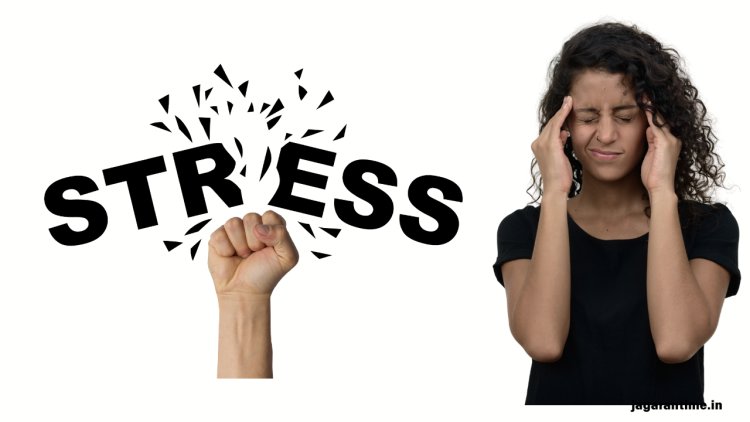Say Goodbye to Stress and Anxiety! 8 Easy Tips to Keep Your Mind Calm
Feeling overwhelmed with stress and anxiety? Discover 8 simple and effective tips to calm your mind, reduce negativity, and boost your mental health.

In today’s fast-paced world, stress and anxiety have become a part of daily life. Be it work pressure, family responsibilities, health issues, or the constant exposure to information overload—our mental peace is often compromised. While a little stress can sometimes act as a motivator, chronic stress and anxiety can lead to burnout, depression, insomnia, and even physical health issues.
The good news? You can regain control over your thoughts and emotions with some easy-to-follow daily practices. This blog brings you 8 scientifically-backed and highly effective techniques to manage stress and anxiety and help restore your mental calm.
1. Deep Breathing: A Simple Yet Powerful Tool
Deep breathing is one of the easiest and most effective techniques to reduce stress instantly. When we take slow, deep breaths, we activate the parasympathetic nervous system, which slows down our heart rate and promotes relaxation.
How to do it:
- Sit comfortably.
- Inhale slowly through your nose for 4 seconds.
- Hold your breath for 4 seconds.
- Exhale slowly through your mouth for 4 seconds.
- Repeat 5–10 times.
Practicing this technique daily, even for 5 minutes, can significantly reduce anxiety and calm your mind.
????♂️ 2. Meditation & Mindfulness: Train Your Mind to Stay in the Present
Meditation is a timeless tool for calming the mind. Mindfulness meditation, in particular, helps train the brain to stay in the present moment instead of being trapped in past regrets or future worries.
Benefits of Mindfulness:
- Reduces rumination.
- Enhances emotional regulation.
- Improves concentration and memory.
- Reduces symptoms of anxiety and depression.
Start Simple:
Just close your eyes, focus on your breath, and let go of any wandering thoughts. You can also use guided meditation apps like Calm or Headspace to get started.
3. Regular Exercise: Natural Stress Buster
Exercise is not just good for your body; it’s great for your mind too. Physical activity triggers the release of endorphins—your body’s natural “feel-good” hormones.
Best types of exercise for stress relief:
- Walking in nature
- Yoga and stretching
- Cycling
- Dancing
- Swimming
Just 30 minutes of moderate exercise a day can improve your mood and reduce anxiety levels.
4. Prioritize Quality Sleep
Poor sleep and stress are closely linked. Stress disrupts your sleep, and lack of sleep makes you more susceptible to stress.
Tips for better sleep:
- Stick to a consistent sleep schedule.
- Avoid screens at least 1 hour before bed.
- Reduce caffeine intake in the evening.
- Try calming bedtime rituals like reading or light music.
A rested mind is better equipped to deal with daily stressors.
5. Journaling: Express to Heal
Writing down your thoughts and emotions can act as a mental detox. Journaling gives you the space to explore your inner world and identify what triggers your anxiety.
Journaling ideas:
- Gratitude journaling: Write 3 things you're grateful for daily.
- Emotional journaling: Express how you feel, uncensored.
- Affirmations: Write positive statements to boost your self-belief.
Over time, journaling builds self-awareness and emotional resilience.
6. Limit Caffeine and Alcohol: Know What You Consume
Too much caffeine can increase heart rate and induce panic-like symptoms. Alcohol, though it may seem relaxing initially, can disrupt your sleep and mood over time.
Smart substitutions:
- Herbal teas (like chamomile or ashwagandha)
- Decaf coffee
- Warm lemon water
Being mindful of your consumption can greatly influence your mental state.
7. Stay Connected: Talk, Share, and Support
Human connection is vital for mental health. Isolation or withdrawal can worsen stress and lead to depressive feelings.
How to stay connected:
- Call a friend or family member regularly.
- Join a community group or club.
- Talk to a therapist or counselor when needed.
Even short positive interactions can have a long-lasting impact on your mental health.
8. Engage in Creative Activities: Let Your Mind Flow
Creativity is therapeutic. When you're absorbed in a creative task, your mind gets a break from overthinking.
Creative outlets you can try:
- Drawing or painting
- Singing or learning a musical instrument
- Cooking or baking
- Gardening
- DIY crafts or photography
Doing something you love not only reduces stress but also boosts self-esteem and joy.
Build a Lifestyle of Balance
Stress and anxiety may not disappear overnight, but with consistent effort and healthy habits, you can drastically reduce their impact. The key is to create a sustainable daily routine that prioritizes self-care—physically, emotionally, and mentally.
Also, remember that it's okay to ask for help. If your stress feels overwhelming or unmanageable, don’t hesitate to consult a mental health professional.
You deserve a peaceful mind and a joyful life—start taking small steps today.
Disclaimer:
This blog is for informational purposes only. If you are experiencing severe stress, anxiety, or any mental health issues, please consult a qualified mental health professional or counselor. Self-help methods may not replace clinical treatment in all cases.













